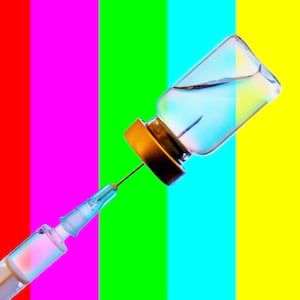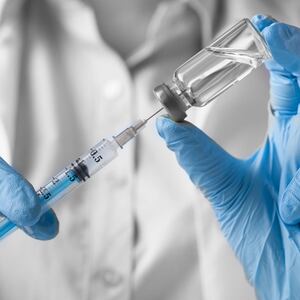The variant news cycle is back.
Last week, South Africa identified a new COVID-19 variant. Dubbed “Omicron” by the World Health Organization, it contains enough mutations to make it a “variant of concern.” At the moment, scientists don’t know whether it is more dangerous or more contagious than Delta, the COVID-19 variant already dominant in the U.S.
What we do know is that Omicron has added new fuel to a conversation we’ve been doomed to constantly repeat: Will this new variant be the one that defeats the vaccine?
We will never stop asking this question as long as there are pockets of unvaccinated people around the world creating space for new variants to emerge. In lieu of more equitable vaccine distribution, which could keep us one step ahead of variants, there could be another way to break the cycle.
One approach scientists are considering is creating a universal vaccine that will ideally fight off any COVID variant that might arise (or even better, any type of coronavirus in general, like those that cause the common cold).
“The dream of a universal coronavirus vaccine is that it’s a one-and-done intervention,” Anna Bershteyn, a public-health expert at New York University, told The Daily Beast.
Despite how much we’ve still yet to learn about how coronaviruses behave, a universal vaccine appears to be possible, and some even argue that one or more could be rolled out in time to combat Omicron. That hope is tempered by the fact that universal vaccines have a checkered history (we’ve yet to develop a universal flu vaccine, for instance) and could face major challenges in development—some scientific, others related to funding and public interest.
New Recipes
Our current mRNA vaccines train the immune system to recognize the whole spike protein on SARS-CoV-2 (the virus that causes COVID-19). This spike protein is a biological “key” the virus uses to enter our cells, and it’s good at triggering a response from the immune system. But it also tends to accumulate mutations that force the immune system to relearn how to identify it and mount a response. Omicron has 30 mutations in the spike protein region.
So by teaching the body to recognize the spike protein through a vaccine, we may get a great antibody response, but run the risk that the body may not recognize it anymore if enough mutations form.
So far, scientists researching universal COVID vaccines have taken a few different approaches.
One is to fuse together bits of spike proteins pulled from many different SARS-CoV-2 strains, and in essence give the body a scrapbook filled with features present in different variants. That’s the approach pursued by a research team at the University of North Carolina, Chapel Hill. In a study published in June 2021, scientists found that mice who received one of these “chimeric” mRNA vaccines were protected against infection from a bat coronavirus, SARS, SARS-CoV-2, and its beta variant.
The other approach is to create a vaccine that targets a feature that most coronaviruses (or at least SARS-CoV-2 variants) have in common.
“If you want to make a universal vaccine, what you’d want to do is try to make a vaccine that targets something that the virus can’t apparently change,” Steven Zeichner, a pediatrician and infectious disease researcher at the University of Virginia, told The Daily Beast.
Zeichner’s lab is also currently working on a universal COVID vaccine that targets a piece of the spike protein called the fusion peptide—that piece is relatively unchanged across coronaviruses.
In a pig experiment, Zeichner developed two vaccines: one for SARS-CoV-2 and one for the porcine epidemic diarrhea virus, a coronavirus distantly related to SARS-CoV-2. He found that both vaccines protected the pigs against clinical PEDV. That means these vaccines might be capable of fighting off distantly related coronaviruses, though the immune system’s response wasn’t as robust as he had hoped it would be.
“That suggests that targeting the fusion peptide for a universal coronavirus vaccine is a reasonable thing to try,” said Zeichner.
The fact that a universal vaccine leads to a slightly milder immune response is not unexpected, said Bershteyn. The features that are conserved across variants are probably ones that simply don’t trigger the immune system to go to war as fiercely as the spike protein. But Bershteyn noted that one solution to this tradeoff is to use an adjuvant—a type of additional ingredient that can boost the immune system’s response to a vaccine.
Adjuvants have already been tested in some universal COVID vaccine candidates. One vaccine candidate created by scientists at Duke University used nanoparticles to showcase multiple copies of one conserved piece of the spike protein. When combined with an adjuvant, that vaccine protected macaques against a bat coronavirus, SARS, SARS-CoV-2, and several variants.
Stumbling Blocks
The research into universal COVID vaccines is “lively” said Bershteyn. But is it lively enough to actually produce a viable vaccine in time to combat variants like Delta or Omicron, or variants that will inevitably arise in the future?
William Schaffner, an infectious disease expert at the Vanderbilt University Medical Center cautioned that universal COVID vaccines are likely a long-term dream, not a short-term reality.
“It deserves scientific investment—both the money and time and effort of bright people. Sometimes you have to think about, think about science generationally. If it’s not ready for me, it’ll be ready for my kids and grandkids,” Schaffner told The Daily Beast.
In the interim, he said it’s better for the public to get used to living with booster shots as new variants emerge.
Major COVID vaccine makers have already begun work on boosters targeted around Omicron. Pfizer and BioNTech have already created a DNA template for an Omicron-specific shot. Moderna is also testing Omicron-specific vaccines. (Neither company nor Johnson & Johnson responded to questions about whether they’re pursuing universal vaccines. Moderna referred The Daily Beast to its new roadmap for developing boosters for Omicron and creating hybrid flu-COVID-19 vaccines.)
“The notion that we could update our COVID vaccines the way we update our flu vaccines, for example, on an annual basis, and we all get boosted… That’s perfectly reasonable,” said Schaffner.
Other experts argue we’re closer to a universal vaccine than we think—we just need to support the work. Corey Casper, the CEO of the Infectious Disease Research Institute (IDRI), a non-profit biotech organization, told The Daily Beast that technology needed to make a universal COVID vaccine could “absolutely” be ready in the short-term, but it has been stifled due to low levels of government investment.
The NIH has already awarded $36 million in grants for projects associated with universal COVID vaccine development. Other groups are looking to make investments as well, the Coalition for Epidemic Preparedness has offered $200 million for universal vaccine research.
“We’re talking, like, tens of millions of dollars that are being given to early phase preclinical research,” said Casper. “It’s not the same way we invested in the first generation COVID vaccines.”
IDRI has been developing several different COVID-19 vaccines—some that could be universal COVID vaccines—in partnership with the company Immunity Bio. He has plans to bring several of those vaccines into clinical trials in South Africa in “a matter of weeks.”
“None of that is with the support of the U.S. government,” he said. “Could we simultaneously be mounting a large definitive phase three trial that would make these approaches ready for Omicron in weeks? Absolutely. But that’s something that would require additional government funding.”
Zeichner agreed that “funding is a huge struggle.”
The ability to scale-up studies of universal vaccines isn’t just limited by funding woes—it’s also a practical problem. These types of trials would need people who have not been vaccinated yet. But at this point, most people who haven’t been jabbed are resistant to ever getting the vaccine. Why would they enroll in a clinical trial on something new?
“I’m not really sure how they would run trials to show that their vaccines are effective at this point,” Bershteyn said.
While it seems like universal COVID vaccines could be scientifically possible, it also seems unlikely that they’ll arrive in time to combat Omicron. And even scientists involved in researching universal COVID vaccines are adamant that, for right now, there’s nothing better than a booster shot.
But that doesn’t dampen hope that one day in the future—a near future, hopefully—we could have a one-size-fits all COVID shot. Zeichner, ever the realist, said he is “cautiously optimistic.”








